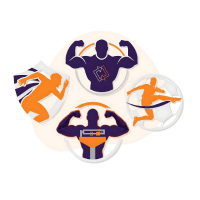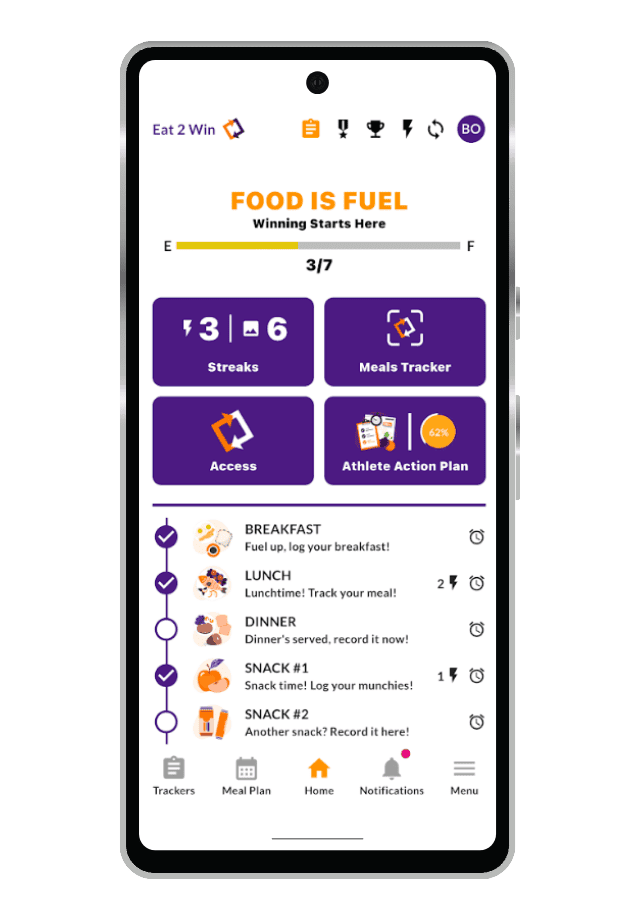
Few, if any, post-game interviews have gained more attention than the one with Richard Sherman after the Seattle Seahawks won the NFC Championship (if you missed it, you can watch the last play here and his interview here). It was an extreme interview, but Sherman’s explosive energy is what gave his football team the edge – it was the difference between first and second place, but it did not come from training. That energy came from proper nutrition.
Football is a challenging sport that requires dedication, strength, and energy — both on and off the field. The importance of nutrition for football players is gaining attention, and top athletes, such as Richard Sherman, understand that energy levels and performance ultimately depend upon what they eat. Now, more football players are becoming curious: what do top football players eat, and how can I take my game to the next level? While each football player has slightly different needs, the top performing players follow these six fueling principles.
Listen to the DEEP DIVE
- Fueling Football Performance_ Six Principles for Peak Play.wav00:00
#1 They Consume Carbohydrates
Carbohydrates are the main fuel source for football players. They are quickly and easily broken down to provide the necessary energy that football players need to react after a snap - or, in Sherman’s case, jump to block the pass for the Seahawks to win the NFC Championship. Football players need to consume appropriate amounts and types of carbohydrates if they want to perform their best.
When and what carbohydrates to consume prior to play:
- If you have 3-4 hours before a game or practice you need to consume complex carbohydrates that take longer to break down and therefore provide long lasting energy. See below for some complex forms.
- Whole wheat pasta, bread and bagels, brown rice, and quinoa (Click here for a full list of whole grains)
- Potatoes
- Beans, lentils and peas
- If you are short on time and only have 1-2 hours before a game or practice then consume a simple carbohydrate snack that will be digested quickly to provide energy sooner. See below for some simple forms.
- Fruit or fruit juice
- Energy chews or gels
- Pretzels
- Crackers
- Energy bars
Pro Tip: Avoid high fiber, high fat foods on game day to avoid gastrointestinal delays and distress. It is also important not try new foods on game day
#2 They Build Lean Muscle
It is essential for football players to be strong and powerful. Therefore, consuming adequate protein for muscle building, recovery, and repair is a must in every football player’s diet. Football players may even have increased protein and caloric needs if trying to build additional mass. Each position and player has individual needs to meet their individual goals such as speed, agility, or possibly size.
- Choose lean protein options more often:
- Lean beef - flank, loin, or ground (90% lean or higher)
- Grilled or baked chicken and turkey breast
- Lean pork (pork chops, loin)
- Eggs
- Low-fat or fat-free dairy products
- Soy and Tofu
- Protein Powders (look for the NSF certified for sport logo on package)
- Limit high fat options:
- Fatty beef - ribeye, porterhouse, or ground (less than 90% lean)
- Fried chicken
- Bacon and hot dogs
- Whole milk or high fat dairy products
#3 They Achieve Their Ideal Body Composition
Every football player has a role on the field based on position. Body composition can then dictate how well a player performs dependent on that position. For example, a linebacker and a running back are not able to switch positions and still perform optimally due to very different position specific body types. Simply put, body composition is the make-up of fat mass and lean mass within the body– which is greatly influenced by what an athlete eats.
Some athletes will need to be lean, mean, speed machines and others will need to gain mass to literally hold their ground in their position. Either way, athletes need to achieve these goals through healthy eating habits. For example, choosing junk food and fast food for extra calories would not be ideal as these extra calories are high in saturated fats and added sugars, which are not ideal for optimal performance.
Additional calories are necessary to gain mass, however to maintain health and performance along with these gains it is recommended to follow a few nutritional strategies:
- Eat frequent snacks between meals to increase calorie and protein intake
- Trail mixes and nut butter sandwiches are great options (high calorie and nutrient dense)
- Cottage cheese with fruit is another great option and high in protein
- Add healthy fats such as oils or nut butters to entrees/sides to increase caloric density
- Maximize the addition of extra toppers when possible
- Sprinkle pasta with cheese, add dried fruits, nuts, and seeds to salads
- Greek yogurt topped with dried fruit and honey is another great option
- Finally, increase portion sizes at main meals if possible
For additional information, check out these two articles:
Both reports on how important it is to monitor athletes’ body fat to help them optimize their athletic performance.
#4 They Eat Right to Reduce Injury and Promote Recovery
Given the nature of the sport, football players’ bodies take a beating. Proper nutrition helps to keep players on the field longer - or return to the field faster if they get injured. When Percy Harvin had hip surgery you bet that his nutrition, full of antioxidants and protein, helped him get back on the field.
Antioxidants, which are primarily found in fruits and vegetables, reduce inflammation and fight off harmful molecules in our bodies that can build up after intense exercise. Think rich, dark, vibrant colors when selecting fruits and vegetables. Some excellent sources of antioxidants include:
- Berries
- Spinach
- Kale
- Whole grains
- Nuts and seeds
- Fatty fish (salmon, mackerel, herring)
- Spices (such as turmeric and ginger)
It is important to stay consistent when it comes to meeting your body’s needs through nutrition. Consuming adequate protein and energy is necessary for muscle repair along with a proper sleep schedule and hydration techniques
Lastly, sleep is a critical factor in recovery from a hard game or practice, especially for football players where the physical demands of the sport are high. Try to get at least 7 or more hours of sleep each night to allow your body enough time to rest and repair before your next event, so you can continue to perform optimally.
#5 They Focus on Pre-Game Nutrition
Proper nutrition is essential year-round for football players, but pre-game meals take the spotlight during the football season. Food needs to fuel the athlete, not slow them down - especially a cornerback like Richard Sherman! Some of the key fundamentals to optimizing a pre-game meal include consuming adequate carbohydrate and properly hydrating to perform your best. More specific information regarding diet plans for football players can be found in Lisa Dorfman’s football nutrition E-book for My Sports Dietitian.
Pre-game Meal and Half-time Recovery Nutrition for Athletes is another great resource about pre-game nutrition. Here, Tavis and Ronnie, co-owners of My Sports Dietitian, provide information about the timing of pre-game meals, the breakdown of nutrients, and half-time nutrition for optimizing athletic performance.
#6 They Don’t Ignore Fueling During the Game
Fueling during a game is extremely important and should further emphasize carbohydrates, as well as hydration. Some professional football players think outside of the box – or cup – for their during the game fuel. Marshawn “Beast Mode” Lynch eats Skittles while on the sideline, and Gushers are Sherman’s go-to snack. While candy can work as a simple carbohydrate option, Gatorade, sports bars/gels, fruit, or potatoes can also make optimal choices. Simple carbohydrates are the preferred fuel source as they break down quickly, providing a rapid source of energy to keep you performing at a high level.
As you can see nutrition plays a large role in a football player’s performance. Daily nutrition should always remain the priority. Well balanced meals should include carbohydrates, lean protein, and healthy fats. Fueling during workouts is also important, since practices can last for several hours each day. If you want to learn more regarding nutrition during a workout Click Here to listen to Tavis.
If you’re interested in more information on these topics, check out the Performance Nutrition for Football Players eBook. This blog has highlighted a few of the key concepts that can be found there. Information on myfootballnutrition.com dives deeper into subjects such as position specific goals, supplementation, and many more nutrition-related concepts that are important for football players. It also provides examples of diets to follow, along with the scientific breakdown of how we use carbs, fats, and proteins for fuel and growth. Myfootballnutrition.com is a great resource for any football player wanting to optimize his performance and gain the advantage!
You can also listen to Lisa Dorfman's interview on the Next Level Podcast show as she discusses the challenges of fueling football players.
Eat 2 Win Nutrition App
Fuel the Champion Within

Trackers
Stay on target with cutting-edge trackers that monitor every step of your journey, ensuring you never miss a beat.

Meal Plan Guides
Simplify your nutrition with easy-to-follow, personalized meal plans that fuel your performance.

Gamification
Stay motivated and engaged by earning rewards and climbing leaderboards as you hit your fitness and nutrition goals.

Access a Sports Dietitian
Get expert guidance and personalized support from a certified Sports Dietitian whenever you need it.

Personalized Programs
Unlock your full potential with personalized programs meticulously crafted to match your unique lifestyle and fitness aspirations.



